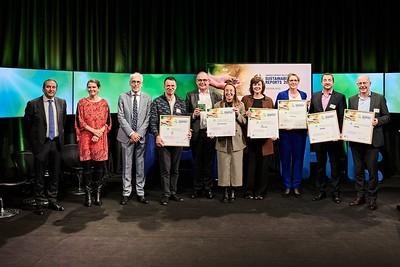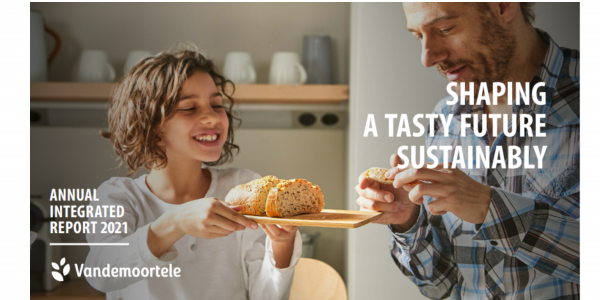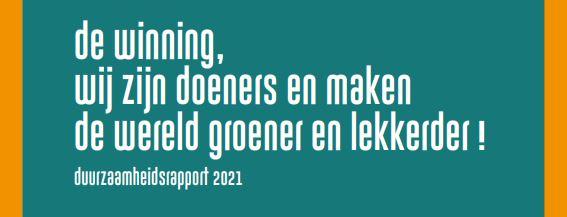Sustainability reporting – inspiring practices

The 2022 edition of the Awards for Best Belgian Sustainability Reports took place last November. The initiative by IBR/IRE give organizations the opportunity to gain in visibility and to create awareness to raise awareness and facilitate the dissemination of best practices on sustainability reporting in Belgium. Prior to the award ceremony, Prof. dr. Abigail Levrau, represented GUBERNA in the panel discussing the challenges boards of directors face on their journey towards sustainable value creation. Transparent and verified external reporting on ESG targets is key as a mean to an end! Congratulations to all winners and proud that some of them are already GUBERNA members!
For more than 20 years, the Institute of Registered Auditors has been highlighting organizations that publish information on their activities which makes a difference in terms of Environment, Social and Governance disclosure.
Given this track record, they are able to identify four major trends:
- Embedding sustainability into governance and business strategy (not a separate activity)
- Clarification of sustainability context and the company’s foodprint in the supply chain
- Entering into more balanced reports; companies daring to share negative impact/stories too
- Better explanation on how the company contribute to the Sustainability Development Goals (including materiality matrix)
Besides some companies are looking for creative and innovative ways in reporting, with visual appealing eye-catchers, interview techniques etc.
And the awards go to ...
De Winning and Vandemoortele are the winners of the Awards for Best Belgian Sustainability Reports with best impact. Download their reports here:

Vandemoortele is a Belgian family business active in de food industry.
Yvon Guérin “The main reason to publish an integrated report with financial and non-financial information is that it reflects our ‘integrated’ strategy. Sustainability is not a bolt-on. It is an integral part of our strategy and identity.”
Aurélie Comhaire – Group Sustainability Manager: “By combining our financial and non-financial reporting in one integrated report, we offer our stakeholders a clear, concise and integrated story that explains how value is created in our organisation.”

De Winning is a social, inclusive company. Their activities focus on nature and green space management, organic agriculture and horticulture, food and distribution, and hospitality.
Cindy Vanvelthoven -Marketing en Communicatie: “We are very proud of the Award! It is a recognition for all our employees who are committed every day. Creating social and societal impact is a continuous journey. The sustainability report is a tool for us to take steps forward. So that both our employees and the organization can continue to grow.”
In the four other categories, this year’s Awards were won by:
- Schréder and Oxfam Fair Trade (Best first Sustainability Report)
- Elia (Best Sustainability Report on Stakeholder Inclusiveness and Engagement)
- De Winning (Best Sustainability Report in Creativity and Originality)
- Schréder (Sustainability Report Best Linked to the 2030 SDGs Agenda)
The main aim of the Awards for Best Belgian Sustainability Reports initiative is to encourage companies to report transparently on sustainability issues as well as to raise awareness and facilitate the dissemination of best practices on sustainability reporting in Belgium and on how to engage in a transparent and effective dialogue with stakeholders.
Do not wait for regulation !
Companies competing for the Award are preparing themselves for the upcoming regulation and increased expectation from financial investors, according to Marc Daelman, Chair of the Jury. The Corporate Sustainability Reporting Directive (CSRD) has recently been adopted and the rules will start applying from 2024 onwards. The impact is considerable : in Belgium, it is estimated that around 2,500 companies will be impacted. Also Belgian SME’s will feel the change. Large companies - as part of their supply chain due diligence procedures and footprint analysis- will request from stakeholders within their supply chain (eg. SMEs being suppliers, customers, subsidiaries…) additional transparency and disclosures (eg. Policies, risk assessment, management approach, performance…). But also banks will increasingly ask for more qualitative sustainability data. In this respect a call to action for all companies is present. A forewarned man is worth two!

Assurance to enhance the credibility of sustainability reporting
Sustainability reporting is here to stay. Awards put the spotlights on best practices but companies are struggling. In fact, the multitude and heterogeneity of requirements and frameworks cause numerous inconsistencies in reporting practices. Green washing and social washing lurk around the corner. All these observations give doubt whether users’ need are effectively met.
Not surprisingly, the EU took action by including the mandatory assurance in the CRSD, in this respect stressing the belief in the added value of external verification.
However, in contrast to financial information, assurance of sustainability information is less straightforward due to the complexity (such as different users with diverging objectives and expectations, variety and complexity of sustainability topic related to particularities of industry/company, difficulties of impact measurement etc.). Moreover, the CSRD has introduced a shift from single to double materiality, requiring companies to report both on how sustainability issues affect their performance, position and development (the ‘outside-in’ perspective), and on their impact on people and the environment (the ‘inside-out’ perspective). The shift presents additional challenges–and costs–in practice.
The question arises can assurance meet the expectations? In GUBERNA’s point of view there are still many challenges to tackle to reach the maturity and credibility in sustainability reporting. Practice is still premature but learning: we are not yet there.
If introduced to early, assurance of non-financial reporting might overshoot the mark. Nonetheless, it has the potential to add value on a number of conditions:
- A clear framework against which to analyse (both by companies, investors and assurance providers).
- A methodology (similar to auditing standards) adapted for sustainability information that guarantees the quality of the assurance. In this respect the development of standards (such as the EFRAG and ISSB) can be applauded in the strive for more uniform reporting on sustainability topics.
- An independent assurance provider whose functioning is transparent and who has the necessary knowledge/expertise.
Finally, GUBERNA believes that the real change should come from transformation of a company’s business model by fully integrating sustainability into the strategy. Reporting requirements should be considered as a tool to reflect on genuine actions rather than as a mere compliance exercise.
